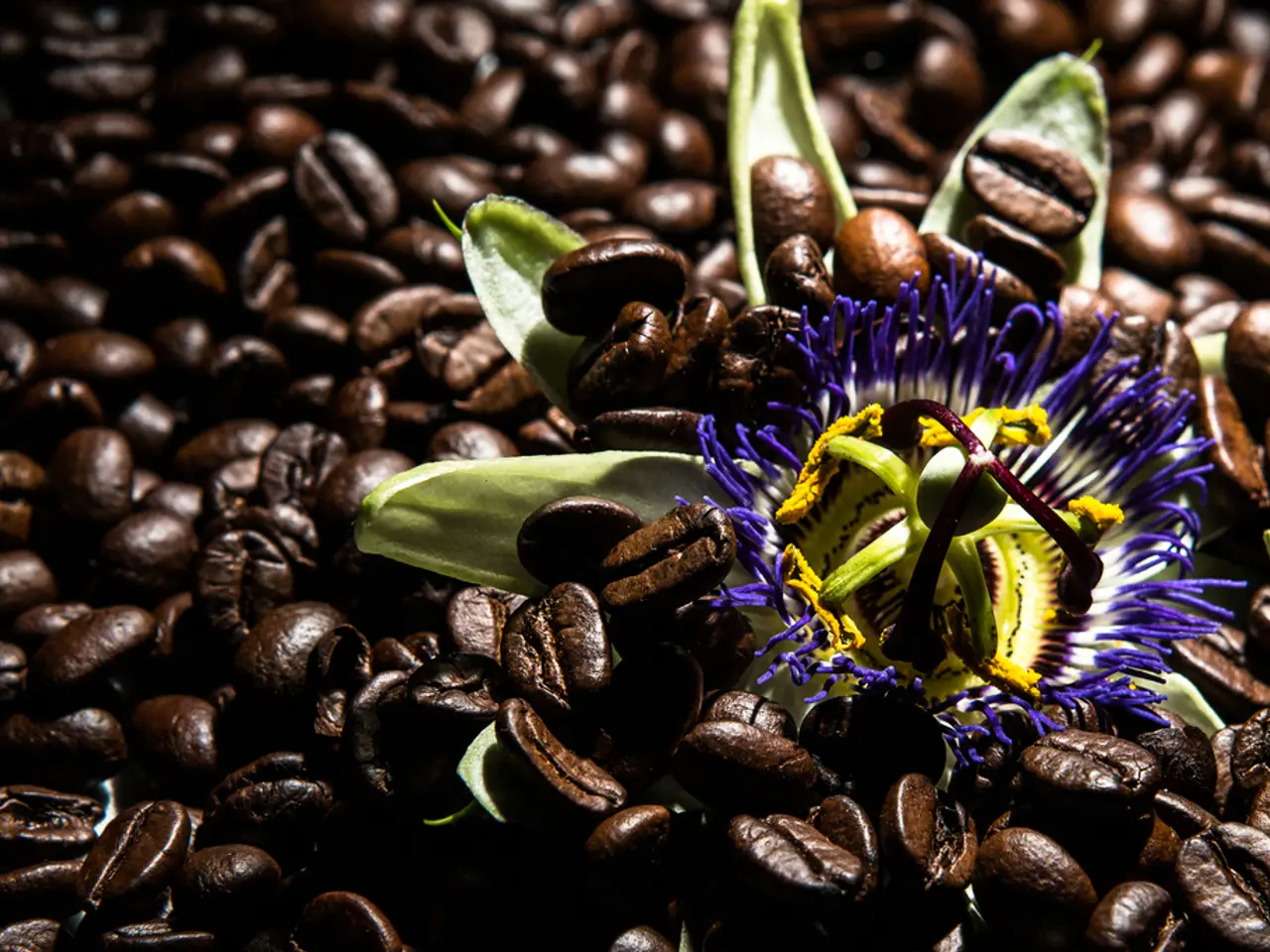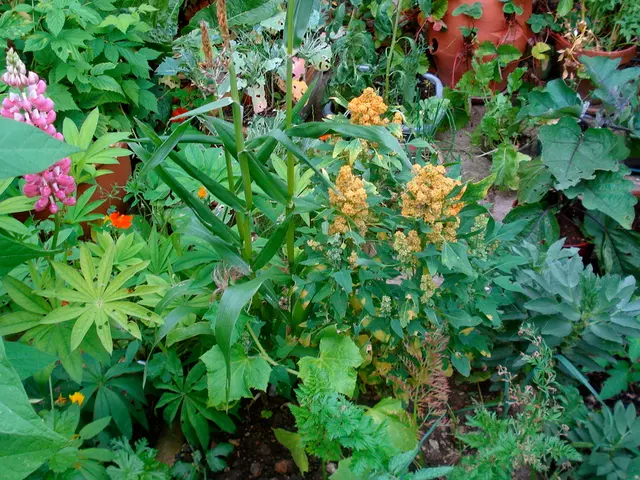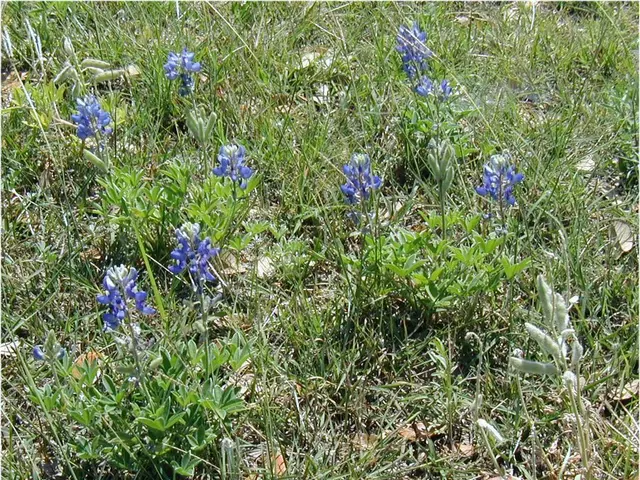Innovative Methods to Repurpose Used Coffee Grinds for a Vibrant, Thriving Garden:
Turning Your Trash into Treasure: The Unexpected Benefits of Coffee Grounds in Gardening
Say goodbye to that morning coffee waste - it's time to repurpose those coffee grounds in your garden! As it turns out, these discarded grounds are packed with nutrients and natural compounds that can transform your outdoor space. Here are 21 clever and practical ways to put your everyday waste to work in your garden.
1. Embracing Composting Gold
Tossing your used grounds into a compost bin introduces a valuable, nitrogen-rich material that balances out carbon-heavy elements like dried leaves and paper. This helps speed up decomposition and produces nutrient-dense compost. As the grounds break down, they contribute essential elements like potassium and magnesium. Regularly adding them helps create an even mix of green and brown compost, ensuring better smell control. Don't forget to mix them in well to prevent clumping.
2. A Soil Boost for Your Garden Beds
Mix leftover grounds into your garden beds to improve soil texture and fertility. Not only does this organic boost retain moisture, but it also nurtures the tiny lifeforms that sustain healthy soil. It also enhances microbial activity, which, in turn, benefits plant roots. Simply spread the thinly and blend into the top layer for optimal results.
3. The Secret Attraction to Earthworms
Worms thrive in rich, organic matter. Introducing coffee grounds to your beds helps create a more welcoming environment, encouraging these beneficial creatures to move in and facilitate soil structure improvements. Earthworms support drainage and aeration, and their castings boost soil fertility. To avoid affecting pH balance, avoid adding too much at once.
4. Defending Against Pesky Slugs and Snails
Some gardeners use dry grounds around plants as a deterrent for slugs and snails. The idea is that the texture might be uncomfortable to these pests to cross. However, scientific evidence is mixed regarding its effectiveness. Reapply after heavy rain to maintain any deterrent effect. Consider this method as a complementary tool alongside other pest control strategies.
5. Regulating Fungal Growth
Applying coffee grounds as a light dusting around the base of plants may discourage fungal growth, although scientific studies are limited. Some gardeners claim success in keeping mold and mildew at bay. The grounds may support better drainage, reducing moisture build-up. Use sparingly to avoid soil compaction, and monitor plant health to ensure no negative effects.
6. Brewing Nutrient-Rich Plant Food
Steep your grounds in water overnight to create a nutrient-packed liquid that can be gently poured around your garden as a natural booster. Use the mixture weekly for consistent results. Remember to strain it well before applying.
7. Nurturing Acid-Loving Plants
Some plants thrive in more acidic soil. Add spent coffee to the base of acid-lovers like azaleas and hydrangeas to help balance pH. Be cautious not to over-acidify the soil. Observe plant growth closely and adjust accordingly. Light, occasional applications work best.
8. Aid Seed Germination
Application of coffee grounds in moderation can improve seed germination by enhancing soil texture and moisture retention. Be mindful of using too much, as it may inhibit germination by overwhelming delicate seedlings. Test on a small batch of seedlings first.
9. Nutrition for Worm Bin Lovers
For vermicomposting enthusiasts, coffee grounds make a perfect addition. Mix them with shredded paper and vegetable scraps for a balanced diet that supports active worm colonies. Avoid sugary or flavored coffee grounds.
10. Enhancing Container Drainage
Mix coffee grounds with perlite, sand, or peat moss to improve water flow in heavy potting mixes. Grounds contribute to better oxygen flow and aeration, providing plant roots with better access to moisture and nutrients. Be careful not to create water-logged conditions.
11. Keeping Cats Away from Your Garden
Many cats steer clear of areas covered in coffee. Spread a layer where feline visitors aren't welcome to deter unwanted digging. This trick works well in flower beds, vegetable patches, and garden beds. Reapply after rain or watering. There's no harm to the animal.
12. Weed Control and Soil Improvement (Double Duty!)
A light covering can help limit sunlight to weed seeds while providing soil improvement. The grounds are dense and break down over time, feeding the soil below. Their effects on nearby plants can vary; use with caution, and always mix with other mulch materials like leaves or straw.
13. Confusing Ant Trails
Even though scientific evidence suggests limited effectiveness, some claim that coffee grounds disrupt ant trails. Sprinkle the grounds near entry points or nests as a gentle alternative pest deterrent. Pair with citrus peels or vinegar for stronger results.
14. Fertilizing Your Lawn Naturally
Combine coffee grounds with grass clippings to create a homemade lawn treatment rich in nutrients. Spread the mixture thinly over your lawn for steady plant support. Rake lightly to ensure even distribution. A monthly application will visibly improve your lawn health.
15. Helping Stressed Plants Recover
Give underperforming plants a nutrient boost by working coffee grounds into the soil around their base. Observe any visible effects and adjust accordingly to provide a customized care routine.
16. Enhancing Garden Path Appearance
Spread coffee grounds across garden walkways for a natural, rustic look and reduced dust. This also retains moisture and complements natural paths. Coffee grounds contribute to soil health as they break down. Combine with wood chips or gravel for durability.
17. A DIY Cleaning Solution
The gritty texture makes a perfect cleaning agent for gardening tools. Use a paste made by mixing the grounds with a touch of water or oil to polish and clean metal surfaces. This eco-friendly approach protects your tools for longer and keeps them in top shape.
18. Odor Control for Your Compost
If your compost pile starts to smell funky, toss in some coffee grounds to help neutralize odors and get back on track. The grounds absorb excess moisture and mask bad smells. They also speed up the breakdown of organic materials.
19. Tomato Plant Enhancement
Tomatoes often react well to extra nutrients. However, applying coffee grounds directly may be too strong for the plant. Instead, compost the grounds first and work the compost into the soil around the tomato plant's base. Observe the plant's response and adjust as needed.
20. Aerating Heavy Soil
Coffee grounds can help break up dense, compacted soils like clay by adding organic matter, improving airflow, and facilitating root growth. Mix the grounds into heavy garden beds for the best results.
21. Natural Pest Repellent Mix
Mixing coffee grounds, citrus peels, or essential oils may help deter garden pests like mosquitoes and gnats. While not scientifically proven, this eco-friendly method may reduce pest activity.
From Brew to Bloom
From brewing a cup of joe, to brewing a successful garden, every bit of your coffee can find new life outdoors. Boost soil health, control pests, and support sustainable gardening practices as you put your waste to work. Unearth the potential of every cup - it's a simple, eco-friendly step toward a thriving garden!
- Your home-and-garden lifestyle can benefit from the nutrients in coffee grounds, as they help balance the compost bin's carbon-heavy elements during the decomposition process and create a nutrient-dense compost that can improve your lifestyle and gardening endeavors.
- By incorporating coffee grounds into your home-and-garden lifestyle, you can turn the waste from your home-and-garden into garden gold, enriching the soil of your garden beds, supporting the growth of plants and earthworms, and promoting healthier soil for a more sustainable gardening practice.







